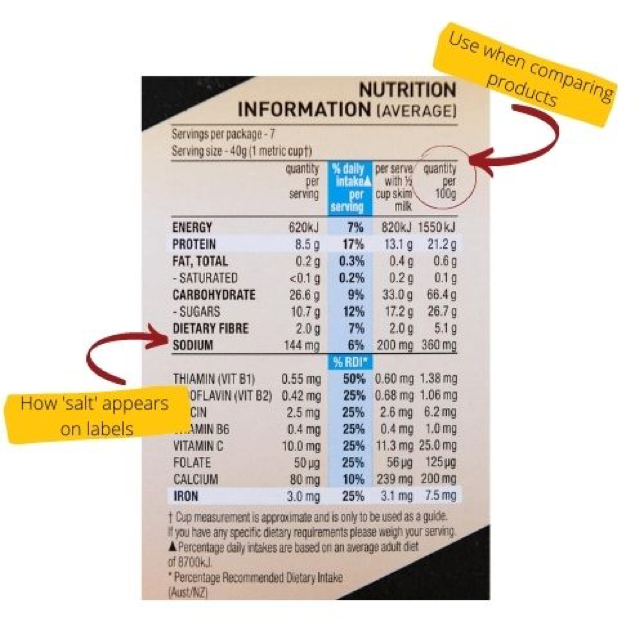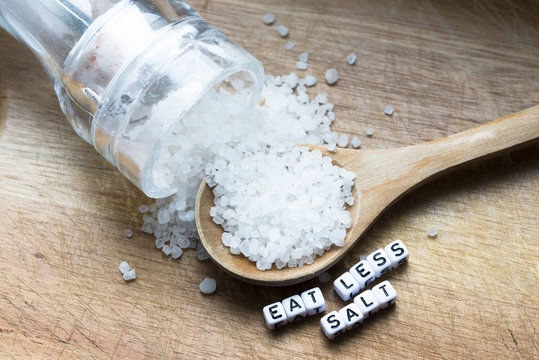What is salt and why do we need it?
Table salt is primarily made up of two minerals, sodium and chloride, both of which are essential for our body to function:
- Sodium plays a role in fluid balance in the body as well as helping to facilitate muscle contractions and nerve impulses.
- Chloride is also an important electrolyte in maintaining blood pressure and pH levels and plays a role in the formation of stomach acid.
Salt is commonly used by the food industry to create highly palatable fast food, pre-made sauces, and packaged products; making it increasingly difficult to consume salt in moderation. With this in mind, it is important for us to become more aware of the amount of salt we are consuming on a daily basis and how much is contained within the products that we are purchasing.
The issue with too much salt
Australians are consuming on average two times the daily recommended amount of salt. While adequate salt intake is beneficial in supporting normal body function, consuming too much salt, can tip the balance and negatively impact our health.
Salt overconsumption is a modifiable risk factor in a variety of chronic diseases. Including:
- High blood pressure / Hypertension.
- Kidney disease
- Heart disease
- Stroke
How much salt should we be consuming?
The suggested target for salt intake is less than 6g a day (2300g sodium), which equates to 1 teaspoon. However, Australians consume around twice the daily recommended intake without even knowing!
Packaged or highly processed foods are also the biggest culprits by far. In fact, they make up a whopping 75-80% of the sodium in most people’s diets. In other words, most of your salt in your diet probably isn’t coming from a salt-shaker. Remember – ALL salt is salt, even the posh sea, rock, and pink salts!
Understanding salt listed on Nutrition Labels
Knowing how much salt is in a package, will help you make a wise choice and avoid hidden salt. Salt can also be listed on the nutrition label as:
- Monosodium Glutamate (MSG)
- Vegetable salt
Here’s a few tips to keep in mind when reading the back of the label:
- Salt is often listed as ‘Sodium’ on nutrition information panels (or the above terms)
- When comparing products, look at the quantity “per 100g/ml” column
- Look for lower salt options, which is normally 100-120mg per 100g/ml

How can we reduce salt in our diet?
ALWAYS check the nutrition label! Anything that has more than 400mg of sodium per serving should stay on the supermarket shelf. Some other simple swaps:
- Purchase fresh meat and poultry, and limit the amount of cured, smoked, and salted varieties.
- Experiment with fresh herbs and dried spices to enhance the flavour of your meals instead of adding salt.
space
6 SIMPLE TIPS to reduce your salt intake:
- Cook with fresh ginger, garlic, onion and chilli for Asian stir-fries, noodle dishes and curries.
- Use dried spices such as paprika, coriander powder, cumin powder and garam masala.
- Use fresh or dried herbs such as basil, chives, dill, and spring onion.
- Citrus such as lemon and lime can be squeezed into cooked vegetables, in a marinade for meat and seafood and also over salad will help to brighten flavours.
- Infused olive oils are not only rich in monounsaturated fatty acids, but they also add a rich, enticing flavour to meals and salads.
- Vinegar has a sharp, umami taste that can be used in salad dressings, stir-fries and marinades that is just as satiating as salt.
Get creative and let us know how you go with replacing your sprinkle of salt without pinching the flavour. MORE FLAVOUR & LESS SALT!
space space space
space space space
Dietitian bookings with Jean-Mari are by appointment

Jean-Mari is passionate about heart health and would love to help you incorporate these heart healthy principles.
BURLEIGH, BUNDALL and MURWILLUMBAH // please contact to arrange a time.
TWEED // On-site every Thursday. Contact for an appointment.
PARKWOOD // On-site every Friday. Contact for an appointment.
space space space
space space space
space space space
Author: Munpreet Dillon – Student Dietitian // Edited: Jean-Mari Mouton & Alycia Mann (Student Dietitian)

